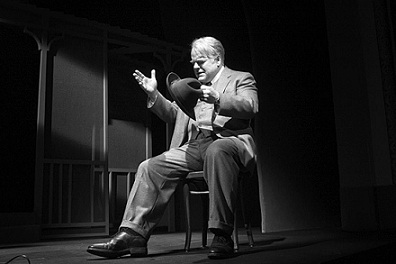« Johnny Depp as Tonto | Home | Bad Love: Back with a vengeance »
March 15, 2012

Death of a Salesman. (Spoiler alert! He dies.)

I'm going to be honest here. I think Death of a Salesman might be the worst Great American Play. Sure, it's sad and tragic, and we can all agree that the American Dream often fails to bring any happiness or satisfaction to people who chase it. But the story of Willy Loman is told with zero nuance or depth, and the themes are made obvious by the characters reciting them, repeatedly, in actual lines of dialogue. When a play has lines like, "Willy doesn't know who he is", "I get so lonely", and "The only thing you've got in this world is what you can sell," and they're repeated over and over, it seems like more of a reading comprehension exercise in a 9th grade English textbook than a great work of literature. This is what wins Pulitzers?
But for some reason, it's on Broadway, directed by Mike Nichols and starring Philip Seymour Hoffman. They do a pretty good job with limited material. The acting is mostly great, especially (of course) PSH at Willy Loman and Linda Emond, who plays his wife Linda. Willy Loman is a small man, but PSH has made a huge performance out of him. Linda Emond is more restrained than the other actors, and conveys the quiet desperation that I think is a good overall tone for a play this ham-handed.
The thing is, really high quality performances almost amplify the mediocrity of the script. I kept wishing I could see all these believable, compelling characters in a better play. The whole production seems to try to make up for the bad script by simply turning up the volume--there's a LOT of yelling, and lesser actors like Andrew Garfield fall into the trap of mistaking loud talking for acting.
But seeing Philip Seymour Hoffman on stage is a wonderful thing. Willy Loman is maybe the least cool character in literature, and PSH doesn't hold back with the unlikeable blowhard bravado, or with the disillusionment, self-loathing, and shame. He's amazing to watch, but he's so in control that sometimes I lost sight of how out of control Willy is. Maybe there's just no way to do a good job with a play this bad. The play opens tonight, so we'll see what the real critics think.
You know what would be nice? If Philip Seymour Hoffman got to do some more comedies. Remember how hilarious he is in The Big Lebowski showing Jeff Bridges around the house? Wow.
categories:
Celebrities, NYC, Theater
posted by amy at 11:03 AM | #
Trackback Pings
TrackBack URL for this entry:
http://amysrobot.amyinnewyork.com/mt/mt-tb.cgi/1288
Comments
Really up until the 60s, a play was considered mediocre if it didn't have at least one well-turned phrase about "what it all means", preferably several. There was this huge shift somehow---maybe because of Method Acting, which is much less rhetoric-focused than older approaches---where dialogue that was once considered the definition of good became hokey, and stuff that sounded to existing writers like a bare plot outline became the gold standard.
Posted by: That Fuzzy Bastard at March 20, 2012 11:09 PM
Death of a Salesman's themes are certainly valid and interesting, but any work of art that is so flatly and blatantly "about" anything is usually pretty terrible, in my opinion. It would have been a compelling article in Harper's, for example, but as a work of art it's a failure.
I understand that audience expectations were different in 1949, but there are many, many old novels, plays, and movies from that era and earlier that show instead of tell, and succeed artistically as well as thematically. This one just doesn't. I'm not a big fan of Tennessee Williams or Eugene O'Neill, either, but they both reveal truer emotional depth about human experience in plays like Streetcar Named Desire and The Iceman Cometh than anything Miller achieves artistically in Salesman. Luckily, great actors can sometimes make something real out of it.
Thank god for the British and the "Kitchen Sink" realism plays, which were also clunky for a while, but I think finally released theater from Arthur Miller's lecturing.
Posted by: amy at March 21, 2012 10:56 AM

In your evaluation of its merits, I think you're de-contextualizing the play. It came out in 1949 and it's about the falsity of the American Dream. In that sense, it seems perhaps ahead of its time. The on-the-nose dialog may feel clunky and trite now, but (I'm guessing) back in those days, it must've been pretty heady stuff for American popular theater.
Posted by: adm at March 16, 2012 2:11 AM